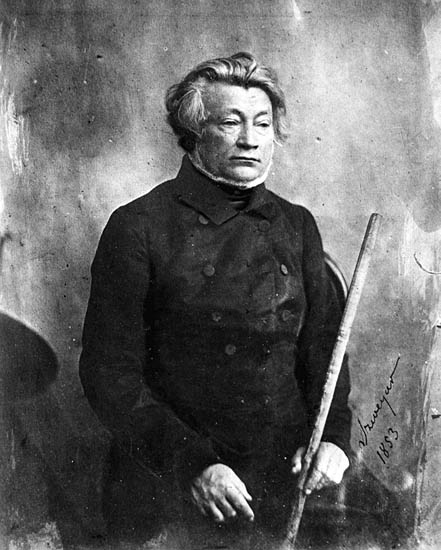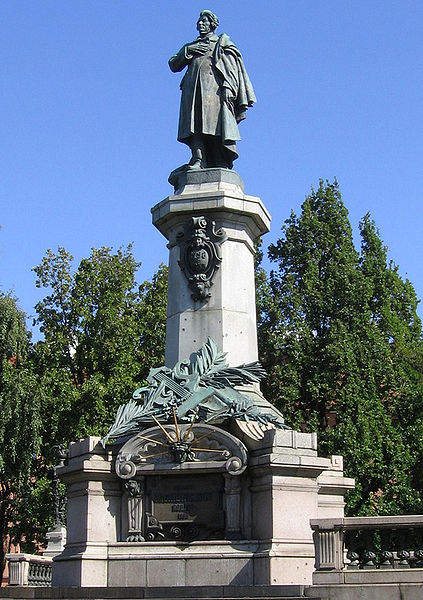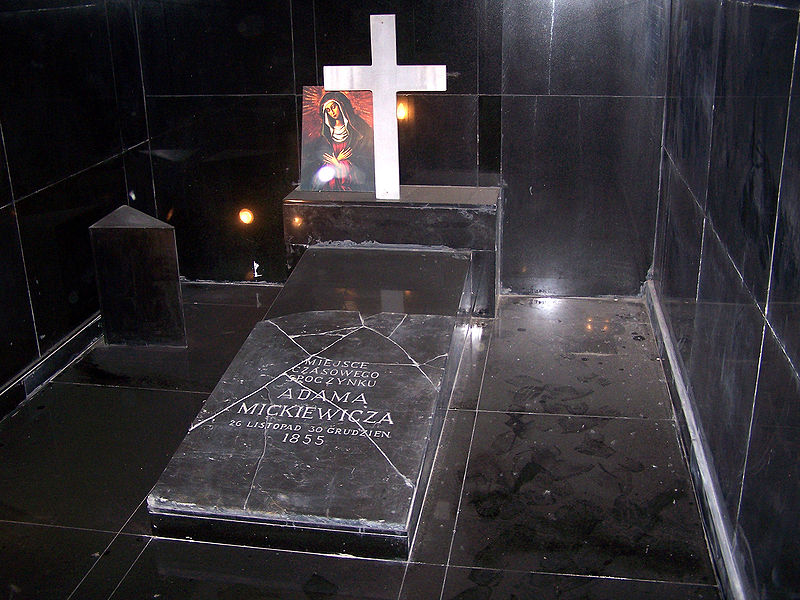<Back to Index>
- Physicist James Prescott Joule, 1818
- Poet Adam Bernard Mickiewicz, 1798
- Sultan of the Ottoman Empire Selim III, 1761
PAGE SPONSOR


Adam Bernard Mickiewicz (December 24, 1798 – November 26, 1855) was a Romantic poet, writing in the Polish language, and described variously as a Pole, a Lithuanian or a Polish - Lithuanian. He is one of Poland's Three Bards – a national poet of Poland and one of the greatest Slavic language poets alongside Alexander Pushkin. He has also been described as a transformation poet and Slavonic bard. He was the most prominent creator of Romantic drama in Poland, compared both at home and in Western Europe to Byron and Goethe. He is known primarily as the author of the poetic novel Dziady and national epic Pan Tadeusz, which is considered the last great epic of Polish - Lithuanian noble culture. Mickiewicz's other influential works include Konrad Wallenrod and Grażyna. All served as inspiration during regional rebellions and as foundations for the concept of Poland as "the Christ of Nations."
Mickiewicz was active in the struggle to achieve independence for his homeland, then part of the Russian Empire. Having spent five years in internal exile in central Russia for political activities, he left the Empire in 1829 and spent the rest of his life in exile, settling first in Rome, later in Paris, where he became professor of Slavic literature at the Collège de France. He died, probably of cholera, at Constantinople in the Ottoman Empire, where he had gone to help organize Polish forces to fight against Russia in the Crimean War. His remains were later moved to Wawel Cathedral in Kraków, Poland.
Adam Mickiewicz was born at his uncle's estate in Zaosie (now Zavosse) near Navahrudak in what was then the Russian Empire (now Belarus). The region had been a part of the Grand Duchy of Lithuania until the 1795 Third Partition of the Polish - Lithuanian Commonwealth. The area had historically been populated by ethnic Lithuanians, although at the time of his birth it was largely Belarusian. Belarusian folklore would exert a major influence on his work along with Lithuanian historic themes. His father, Mikołaj Mickiewicz, was a member of the nobility of the Polish - Lithuanian Commonwealth and bore the hereditary Poraj coat of arms. Mickiewicz enrolled at the Imperial University of Vilnius. His personality and later works were greatly influenced by his four years of living and studying in Vilnius.
He took a strong interest in Polish, Belarusian, and Lithuanian
history, which later became important themes in his poetry. In 1817,
together with Tomasz Zan and other friends, he created a secret organization, the Philomaths, that advocated progressive causes and independence from the Russian Empire. Following graduation, in 1819 – 23, under the terms of his university scholarship, he taught secondary school at Kaunas. In 1823 he was arrested, investigated for his political activities (membership in the Philomaths) and in 1824 banished to central Russia. He had already published two small volumes of miscellaneous poetry at Vilnius, which had been favorably received by the Slavic public, and on his arrival at Saint Petersburg found
himself welcomed into the leading literary circles, where he became a
great favorite both for his agreeable manners and his extraordinary
talent of improvisation. In 1825 he visited the Crimea, which inspired a collection of sonnets (Sonety Krymskie — The Crimean Sonnets) with their admirably elegant rhythm and rich Oriental coloring. The most beautiful are "The Storm," "Bakhchisaray", and "The Grave of Countess Potocka". In 1828 appeared Mickiewicz's Konrad Wallenrod, a narrative poem describing the battles of the Teutonic Knights with the heathen people of the Great Duchy of Lithuania.
In it, under a thin veil, Mickiewicz represented the sanguinary
passages of arms and burning hatred which had characterized the long
feuds of the Russians and Poles. The objects of the poem, though
obvious to many, escaped the Russian censors, and the poem was allowed
to be published, complete with the telling motto, adapted from Machiavelli: "Dovete adunque sapere come sono duo generazioni da combattere — bisogna essere volpe e leone." ("Ye
shall know that there are two ways of fighting — you must be a fox and
a lion.") This striking long poem contains at least two revered
subsections, including the Alpuhara Ballad. In 1829, after a five year exile in Russia, the poet obtained permission to travel abroad. He went to Weimar and made the acquaintance of Goethe there. After a cordial reception by the latter he continued through Germany all the way to Italy, which he entered by the Splügen Pass. He visited Milan, Venice and Florence, and finally established his residence in Rome. There he wrote the third part of his poem Dziady (Forefathers' Eve), which adverts to the ancestor commemoration that had been practiced by Slavic and Baltic peoples; and Pan Tadeusz, his longest poem, which is considered his masterpiece. The latter epos draws a picture of the Great Duchy of Lithuania on the eve of Napoleon's 1812 expedition to Russia. In this "rural idyll," as Aleksander Brückner calls
it, Mickiewicz gives a picture of the country seats of the Polish
magnates, with their somewhat boisterous but very genuine hospitality.
They are seen just as the knell of their nationalism, as Brückner says, seems to be sounding, and therefore there is something melancholy and dirge-like in the poem, in spite of the pretty love story that forms the main incident. On the first line of Pan Tadeusz Mickiewicz wrote of Lithuania, calling it his "Fatherland", actually referring to his native Grand Duchy of Lithuania through
the eyes of a political exile, and gives some of the most delightful
descriptions of the skies and the forests of current Belarus and Lithuania.
He describes the sounds to be heard in the primeval woods in a country
where the trees were sacred. The depiction of clouds are equally
striking. In 1832 Mickiewicz left Rome, where his life was for some time marked by poverty and unhappiness, for Paris. There, on July 22, 1834, he married Celina Szymanowska, daughter of composer and concert pianist Maria Agata Szymanowska. Marital discord, and Celina's later becoming mentally ill, would cause Mickiewicz to attempt suicide in December 1838, by jumping out of a window. In 1840 Mickiewicz was appointed to the newly founded chair of Slavic languages and literatures at the Collège de France.
He was, however, destined to hold it for little more than three years,
his last lecture being given on May 28, 1844. His mind had become
increasingly possessed by religious mysticism. He had fallen under the influence of the Polish Messianist philosopher Andrzej Towiański.
His lectures became a medley of religion and politics, and thus brought
him under censure by the French government. A selection of his lectures
has been published in four volumes. They contain some sound criticism,
but the philological part is defective — Mickiewicz was no scholar, and it is clear that he was well acquainted with only two of the Slavic literatures, Polish and Russian, and the latter only to 1830. A sad picture of his declining years is given in the memoirs of the Russian writer Alexander Herzen.
Comparatively early, the poet exhibited signs of premature old age;
poverty, despair and domestic affliction had taken their toll. In the
winter of 1848 – 49, the Polish composer Fryderyk Chopin, in the final months of his own life, visited his ailing compatriot and soothed the poet's nerves with his piano music. Over a dozen years earlier, Chopin had set some of Mickiewicz's poems to music. In 1849 Mickiewicz founded a French newspaper, La Tribune des Peuples (The Peoples' Tribune), but survived for only a year. The restoration of the French Empire seemed to kindle his hopes afresh; his last composition is said to have been a Latin ode in honour of Napoleon III. In 1855 Mickiewicz's wife Celina died. On the outbreak of the Crimean War, he left his under-age children in Paris and went to Constantinople, the Ottoman Empire,
where he arrived 22 September 1855, to organize Polish forces to be
used in the war against Russia. With his friend Armand Levy, he set
about organizing a Jewish legion, the Hussars of Israel, comprising
Russian and Palestinian Jews. He returned ill to his apartment from a
trip to a military camp and died on 26 November in his apartment on the
Yenişehir street in Constantinople (now Istanbul). He had most probably contracted cholera. The house where he lived in is now a museum. After
being temporarily buried in a crypt under his apartment in
Constantinople (now Istanbul), his remains were transported to France
and buried at Montmorency. In 1900 they were disinterred, moved to Poland, and entombed in the crypts of Kraków's Wawel Cathedral, which is shared with many of those who are considered important to Poland's political and cultural history. The
political situation in Poland in the 19th century was often reflected
in Polish literature which, since the days of Poland's partitions took
a powerful upward swing and reached its zenith during the period
between 1830 and 1850 in the unsurpassed patriotic writings of
Mickiewicz, among others. Edward Henry Lewinski Corwin wrote of Mickiewicz, describing his works as Promethean, as 'reaching more Polish hearts' than the other Bards of Poland (Zygmunt Krasiński and Juliusz Słowacki), and affirming George Brandes's assessment of Mickiewicz's works as 'healthier' than those of Byron, Shakespeare, Homer, and Goethe. As a young man, Mickiewicz was influensed by Belarusian folklore, as his native town was Navahrudak in the Hrodna region of Belarus. After finishing a school in Navahrudak, he took a leading part in the literary life of the university circles at Vilnius.
When the society of Philomaths was closed in 1823 by order of the
Russian tsar he was arrested and exiled to Russia. While in the Crimea he wrote his sonnets.
In France in 1835 Mickiewicz came under the influence of Towianski, a
mystic, and ceased to write. Toward the end of his days he freed
himself again of this peculiar thrall which Towianski was able to exert
over him. It was while in Istanbul he wrote the Books of the Pilgrims, which have been called "Mickiewicz's Homilies". Beside Konrad Wallenrod and Pan Tadeusz, noteworthy is the long poem Grażyna,
describing the exploits of a Lithuanian chieftainess against the
Teutonic Knights. It was said by Christien Ostrowski to have inspired Emilia Plater, a military heroine of the November 1830 Uprising who died in Lithuania. A fine vigorous Oriental piece is Farys. Notable too are the odes to Youth and to the historian Joachim Lelewel; the former did much to stimulate the efforts of the Poles to shake off their Russian conquerors. His son Władysław Mickiewicz wrote a Vie d'Adam Mickiewicz (Life of Adam Mickiewicz, 4 volumes, Poznań, 1890 – 95) and Adam Mickiewicz, sa vie et son œuvre (Adam Mickiewicz: His Life and Works, Paris, 1888). Adam Mickiewicz is generally known as a Polish poet, since all his works were written in the Polish language, but his ethnicity has been a subject of some controversy. He is described by some authors as "Polish - Lithuanian" or as Belarusian - Polish. Mickiewicz is regarded by some as being of Lithuanian origin, his name being rendered into Lithuanian as Adomas Mickevičius. He was descended from an old Lithuanian noble
family, Rimvydžių – Mickiewicz. The Lithuanian nobility at that time
spoke Polish, though they regarded themselves as Lithuanians. Another
version of his ancestry sees his origins as "Lithuanian - Belarusian (and
perhaps Jewish)." According to the Belarusian historian Rybczonek, Mickiewicz's mother had Tatar roots. Some sources assert that Mickiewicz's mother was descended from a converted Frankist Jewish family. Other sources view this as improbable. Mickiewicz had been brought up in the culture of the Polish - Lithuanian Commonwealth, a multi-cultural state that had encompassed most of what today are the separate countries of Poland, Lithuania, Latvia, Belarus and Ukraine. His most famous poetic work, Pan Tadeusz, begins with the invocation, "O Lithuania, my country, thou art like good health..." It is generally accepted that in Mickiewicz's time the term "Lithuania" still carried a strong association with the Grand Duchy of Lithuania, which had been part of the Polish - Lithuanian Commonwealth, and that Mickiewicz used the term "Lithuania" in a political rather than an ethnic sense.



